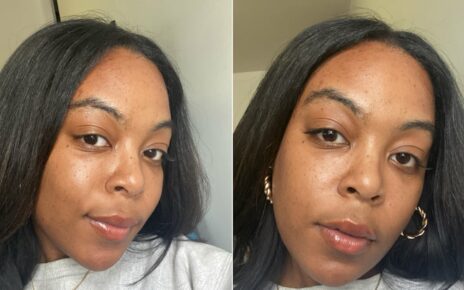Fact: I’m someone who guzzles black tea and coffee like it’s the last form of liquid on Earth. Which means I’m also someone who knows their way around whitening toothpastes, at-home whitening products, and whitening strips. If a tooth-whitening system has gone viral, you can guarantee I’ve tried it (hi, Snow Teeth Whitening). The only issue? I’m v lazy. So even though I love my Crest 3DWhite Strips with LED Light, I wanted something easier and more permanent. Enter: Laser teeth whitening.
As a refresher, laser teeth whitening is a professional in-office bleaching treatment that’ll give you bright-white teeth within an hour—and the results last. But before I made an appointment, I chatted with Alex Rubinov, DDS, a cosmetic dentist in New York, NY, to find out if laser teeth whitening is actually good for your teeth, how long your teeth stay white afterwards, how much it costs, and how painful it is. Keep reading for the ultimate breakdown to laser teeth whitening.
What is laser teeth whitening?
Laser teeth whitening is a professional bleaching procedure that uses a light-activated whitening gel and a laser, says Rubinov. “The laser helps activate the chemical makeup of the bleaching solution so it can better penetrate your teeth for more effective results,” he says. So despite it being referred to as laser teeth whitening, the laser (or light, depending on the type of treatment you get) itself isn’t bleaching your teeth—it’s just boosting the efficacy of the concentrated whitening gel.
⭐ FYI, these at-home whitening kits have 200,000+ five-star reviews ⭐
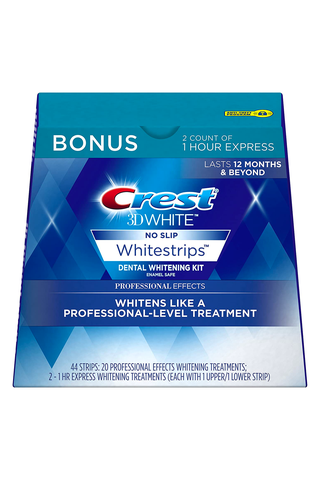
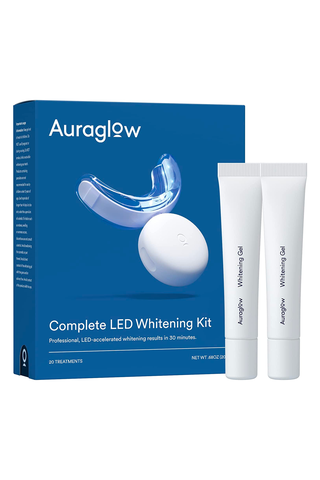
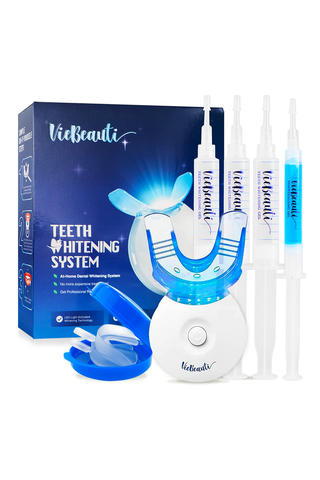
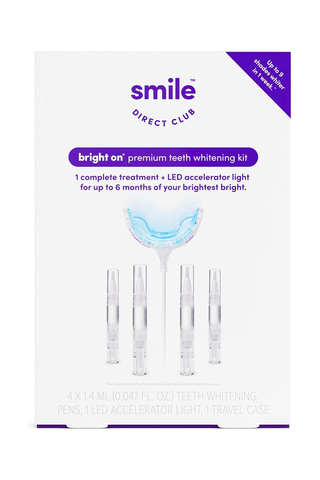
How does laser whitening work?
According to Rubinov, all professional whitening treatments essentially work the same, because they all rely on some variation of high-strength bleaching agents (usually carbamide peroxide and hydrogen peroxide). Rubinov uses one of the most common professional whitening systems, Zoom!, and says the main differences between treatments will come down to a brand’s specific technology and chemical formulation.
Though the steps may vary, here’s what to broadly expect during your treatment:
How long do teeth stay white after laser whitening?
Keeping your teeth bright means following proper post-treatment care for the first 48 hours, which includes refraining from drinking or eating anything that could stain your teeth (see: curry, blueberries, red wine, coffee, black tea, etc.). “Basically, avoid anything that would stain a white shirt if you spilled on it,” says Rubinov.
As for how long your teeth will stay white after laser whitening, you can expect brighter teeth for a few months up to a few years. Unfortunately, it’s impossible to tell how long your teeth will stay white after treatments, because your results will depend on your lifestyle habits (smoking, drinking staining liquids, etc.).
What are the side effects of laser teeth whitening?
Laser teeth whitening is generally safe and effective, and because of the use of a gum barrier, it typically creates little-to-no discomfort or sensitivity during treatment. Any sensitivity that does occur during treatment tends to be mild and short-lived, but, says Rubinov, your dentist should be able to customize and alter the whitening treatment if you experience irritation.
“If a patient is experiencing sensitivity, we can evaluate what’s going on and switch solutions to one that’s less sensitizing,” says Rubinov, adding that he also typically gives “people an Advil beforehand to help avoid any potential zingers or irritation.” That being said, it’s common to experience “some zingers or sensitivity at random times after treatment,” he says, but they’re typically mild, gone in a second, and will usually only occur in the first few days after whitening.
How much does laser teeth whitening cost?
The exact cost of laser teeth whitening will depend on where you live, how competitive and busy your dentist’s office is, and the specific whitening treatment you’re getting. Because laser whitening is a cosmetic procedure and isn’t covered by insurance, the cost can range from $300 to $1,200, so make sure to call a few dentists before making an appointment to ask for a quote.
Laser whitening vs. at-home teeth whitening
At-home whitening and laser teeth whitening use the same type of bleaching agent: peroxide, says Rubinov. The difference is that at-home trays, pens, and strips have a significantly lower percentage of peroxide than professional laser whitening (think: a quarter of the strength). While this low-strength factor makes systems safer for at-home use, it’s not going to give you the same fast, bright, and targeted results as professional whitening—and can even result in more gum sensitivity than at higher strengths.
“In the office, we have the ability to protect the gums, so the bleaching solution only touches the surface of the teeth,” says Rubinov. At-home whitening kits, however, lack the ability for precision, so the bleaching agents can seep across teeth and gums, increasing your risk of tooth sensitivity.
It’s also important to remember that at-home kits only remove surface-level stains from your enamel (the outer layer of your tooth), while laser whitening actually penetrates your enamel and dentin (the layer underneath). It’s why you’re able to use white strips for a few weeks straight without damaging your teeth: Its potency is pretty weak. With laser teeth whitening, however, “the effect is so strong that we don’t do bleaching more than once every six months,” says Rubinov.
The bottom line
Laser teeth whitening is so popular for a reason: It’s fast (an hour, tops), effective, less risky for sensitive teeth, and long-lasting. The only downside? It can be pricey. So if you don’t have the financial means, rest assured that at-home whitening is still an excellent option. These kits won’t give you the same effect or longevity as professional whitening, but they’re relatively affordable and easy to use—so, honestly, better than nothing at all.
Why trust Cosmo?
Chloe Metzger is the deputy beauty director at Cosmopolitan with nearly 10 years of experience researching, writing, and editing oral-health stories including teeth-whitening products and reviews. She’s an authority in all oral-health categories, but is an expert when it comes to laser teeth whitening, thanks to her own lifetime of dealing with yellow, tea-stained teeth. She regularly tests and analyzes products on her own teeth for efficacy, while working with the industry’s top cosmetic dentists and oral surgeons to assess new treatments and products.
Source: Read Full Article

